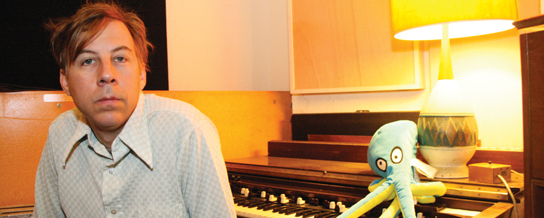Totally Faded: John Vanderslice
For the next four weeks, XLR8R will chat with four indie engineers who invite us […]

Totally Faded: John Vanderslice
For the next four weeks, XLR8R will chat with four indie engineers who invite us […]

For the next four weeks, XLR8R will chat with four indie engineers who invite us into their studios to discuss production philosophies, gear, and how to set your music free. First up is John Vanderslice of Tiny Telephone Studios in San Francisco, where Numbers, Cex, and Spoon have recorded.
Do you have a particular philosophy when entering the studio?
The question “What’s best for the songs?” has to be addressed way before the session. Sometimes you go in blindly, hoping it will sort itself out in the studio, but that’s where the shit can really fall apart! Thinking about what gear to get, borrow, rent, what session players or friends to corral, and trying to set a realistic schedule is a good way to start.
Is there a process which you undergo before you go in?
If I’m working with a band I immerse myself in all of their material, not only new demos, but older records. Then the engineer and I decide what to go for and what to avoid. On the Mountain Goats’ The Sunset Tree, engineer Scott Solter and I decided to lose a lot of distortion we had introduced on the group’s We Shall All Be Healed, keep the tempos up, and go for as much live performance as possible. When Scott and I did my last record, Emerald City, we decided to make it a study in distortions.
Who are you currently working with in your studio?
Scott Solter and I are recording my next record right now. He’s a genius so it’s been pretty smooth sailing. We’re in the middle of a 14-day block; we should have a lot of songs finished by the end. We’re dragging in a lot of session people on this next round: violins, clarinets, oboes, upright basses…
Tape or hard drive?
For my records, it’s always tape. We have a no-computer rule for my own records. For me, everything about random-access recording is amazing except the sound. Tons of bands use Pro Tools at Tiny Telephone as we’re just installing an HD system.
When a band comes into your studio, what do you typically wish they had more prepared, and why?
The common complaint I hear from engineers is that bands bring in very little gear. One bass, one bass amp, one guitar, one guitar amp, etc. Your options run out quick, especially if your gear sucks, which happens all the time.
Who is the most prepared band you’ve worked with, and why?
Deerhoof is extremely prepared and organized. They book way ahead, never move their days, and come in ready to make art.
What’s the centerpiece of your studio?
Our 1976 Neve 5316 mixing console. It’s got 50 channels on mix-down, and it took me five years to pay it off. It was previously owned by the BBC in London and used at Central TV. It’s a beautiful-sounding board.
What pieces of gear do you most often return to?
Millennia Media TD-1, Moog Source, Yamaha grand piano, my Gibson 1952 J-45 acoustic guitar.
What’s the production element you tend to spend the most time on, and why?
Lyrics: For me it all comes down to the content of the songs. Then it’s easy to see what’s possible sonically.
What non-technical things need to be in place before you can record?
Shit-loads of PG Tips tea!
What’s more important than equipment?
The attitude of the band: They have to be wide open to the world and not stuck inside of genre and strait-jacketed by a musical identity.
What records that have been produced at your studio are you particularly proud of, and why?
Here’s a few bands I thought did great work at Tiny Telephone: Granfaloon Bus, Court and Spark, Deerhoof , Death Cab For Cutie, and Okkervil River. There are tons more, Love Like Fire just did some fantastic recordings a few weeks ago.
What are the most important elements to have in check before a record is mastered, and why?
If things don’t sound good already, we’re all in trouble! Mastering should be the most subtle adjustment possible. I think preserving dynamic range in mix-down is key. We don’t use buss compression anymore, we just rely on the Ampex ATR-102 for its wonderful zero-attack compression. When mastering, we always request a reasonable volume–you will not win the volume wars!
In your opinion, what’s the best-produced album ever made, and why? Is there one that you always turn to for its production quality?
I think Slide by Lisa Germano is a really interesting record. It’s a super-stylized, high-concept bedroom record. It’s brilliantly produced by Tchad Blake. As far as the best-produced record, there would be 100s on my list. Early Kinks, Pink Floyd, Bowie, Neutral Milk Hotel, all Radiohead.
What are the most common mistakes that home producers make?
The thing that blows me away is how un-cynical they are about gear. They’ll read reviews as if they’re unbiased and informed. Recording magazines do reviews to get free or discounted gear–they are totally unreliable. There’s more raw information on message boards, but unless you know and respect the person posting, that isn’t very useful either.
Who is one engineer you really look up to?
Scott Solter (who I do work with all the time). I’d love to work with John Congleton, Tucker Martine, Jeff Stuart Saltzman, and Daniel Lanois–the list goes on.-

